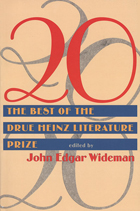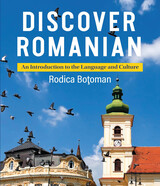
20 represents the best of the best—one story from each of the prize-winning volumes. Chosen by acclaimed author John Edgar Wideman, the selections cover a broad range of inventive and original characters, settings, and emotions, charting the evolution of the short story over the past two decades. One of the most prestigious awards of its kind, the Drue Heinz Literature Prize has helped launch the careers of a score of previously "undiscovered" writers, many of whom have gone on to great critical success.
Past Winners of the Drue Heinz Literature Prize: David Bosworth, Robley Wilson, Jonathan Penner, Randall Silvis, W. D. Wetherell, Rick DeMarinis, Ellen Hunnicutt, Reginald McKnight, Maya Sonenberg, Rick Hillis, Elizabeth Graver, Jane McCafferty, Stewart O’Nan, Jennifer Cornell, Geoffrey Becker, Edith Pearlman, Katherine Vaz, Barbara Croft, Lucy Honig, Adria Bernardi.

This comprehensive introduction to Romanian for English-speaking students emphasizes communication with a complete treatment of grammar, an extensive vocabulary, and a focus on the four major language skills—listening, speaking, reading, and writing. Cultural information, an integral part of the textbook, is presented both formally, in sections on culture and civilization, and informally, as the setting for dialogues and exercises. Tables of verb conjugations and a glossary round out the book’s primary materials.
Straightforward and accessible, Discover Romanian is an essential textbook for all those teaching and learning the language and provides important information for those seeking to understand Romanian culture. Together with the accompanying audio files and workbook, it provides a complete language course.

Proceedings of the Harvard Celtic Colloquium, 20 includes “Retoiric and Composition in Geneamuin Chormaic,” by Hugh Fogarty; “Classical Ethnography and Celts: Can We Trust the Sources?” by Philip Freeman; “Prayers, Prizefights and Prostitution: The Medieval Irish Cemetery and Its Many Uses,” by Susan Leigh Fry; “Magical Realism and the Mabinogi: An Exercise in Methodology,” by Michael Linkletter; “Rebuke and Revision in the Early Irish Annals: The Death-Notices of Muirchertach mac Ercae [†534],” by Laurence Maney; “‘To a man for the King’: The Allegiance of Welsh Catholics during the First Civil War, 1642–46,” by Robert Matthews; “King and Druid,” by Arun Micheelsen; “‘Words, words, words’: Language about Language in France and Ireland,” by Grace Neville; “Ystoria Tri Brenin o Gwlen,” by Prydwyn Piper; and “Highland Motives in the Jacobite Rising of 1745–46: ‘Forcing Out,’ Traditional Documentation and Gaelic Poetry,” by James A. Stewart, Jr.
Proceedings of the Harvard Celtic Colloquium, 21 includes “Gendering the Vita Prima: An Examination of St. Brigid’s Role as ‘Mary of the Gael,’” by Diane Peters Auslander; “Apollonius of Rhodes’ Argonautica: A Mythology of Greek Expansion in Celtic Lands,” by Timothy P. Bridgman; “The Wealth of the Medieval Welsh Gentry: The Case of Gwilym ap Gruffydd of Penrhyn,” by A. D. Carr; “Celtic Languages in the 1910 U.S. Census,” by Jonathan Dembling; “Digging Deeper: Adventures in Medieval Irish Burial and the Case for Interdisciplinary Scholarship,” by Susan Leigh Fry; “Laoiseach Mac an Bhaird and the Politics of Close Reading,” by Sarah E. McKibben; “Prescient Birds and Prospective Kings: Further Comments on Irish Elements in the Eddic Poem Rígsþula,” by Amy Eichhorn Mulligan; “The Descent of the Gods: Creation, Cosmogony, and Divine Order in Lebor Gabála,” by Sharon Paice Macleod; “Babel Is Come Again: Linguistic Colonisation and the Bardic Response in Early Modern Ireland,” by Patricia Palmer; “‘In Defiance of the Gospel and by Authority of the Devil’: Criticism of Welsh Marriage Law by the English Ecclesiastical Establishment and Its Socio-Political Context,” by Laura Radiker; and “The Way We Were: Twentieth Century Brittany through the Eyes of Breton Language Memorialists,” by Lenora Timm.
READERS
Browse our collection.
PUBLISHERS
See BiblioVault's publisher services.
STUDENT SERVICES
Files for college accessibility offices.
UChicago Accessibility Resources
home | accessibility | search | about | contact us
BiblioVault ® 2001 - 2024
The University of Chicago Press









